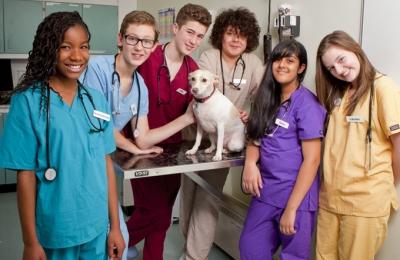'Junior Vets' put through their paces in new TV series
A new series on CBBC filmed at the University’s Royal (Dick) School of Veterinary Studies gives an insight into what it takes to become a vet.

The series, Junior Vets, shows six children from across the UK learning what to do when faced with sick and injured animals.
Training zone
More than 1,000 youngsters applied to take part in the series, which shows youngsters faced with a range a situations.
This includes taking part in a “training zone” to learn key skills, ranging from suturing to identifying abnormalities from X-rays.
The Junior Vets also practiced how to diagnose a pregnancy in a cow, using a specialised training mannequin testing hand and eye coordination.
CBBC Junior Vets
The first of 10 half-an-hour episodes of Junior Vets is being aired at 5.45pm on Monday, 21st January on CBBC.
Veterinary experience
The youngsters, aged between 11 and 14, also worked closely alongside vets gaining hands-on experience and a flavour for what a career in veterinary medicine entails.
Each episode sees the children put into teams of two to carry out that day’s veterinary tasks, both at the University’s vet school and out and about at farms and zoos.
The 10 episodes are presented by Paul Manktelow, a qualified vet who gives advice on the new challenges that the youngsters faced.
Working with animals
Duties included helping to take blood samples from African Dwarf crocodiles, give eye drops to a Penguin, rasp a horse’s teeth and communicate with clients.
The Junior Vets scrubbed up for surgery - including on an African Grey Parrot and a ferret - where they helped monitor the effects of anaesthetic.
One of the more unusual operations involved an Axolotl, an amphibian, who had a lump removed from its head.
Out and about
The Junior Vets helped with milking cows at the vet school’s dairy farm and got involved in taking urine samples to help identify any illnesses.
Their eagle-eyes also kept a look out at Musselburgh Races for any injuries or illnesses among horses.
Many children from a diverse range of backgrounds want to become vets when they are older. This programme really gives a sense of what being a vet entails, and all the different aspects of veterinary work. For youngsters wanting to become a vet, it is immensely rewarding career with so many amazing experiences.
Vet Skills and vital vet work awards
After each training zone activity, Vet Skill Credits were given to the best performing Junior Vets.
Vital Vet Work awards were then given to those who impressed the most during the day’s veterinary work.
Both the credits and awards contributed to who becomes the Head Junior Vet at the end of the series.


